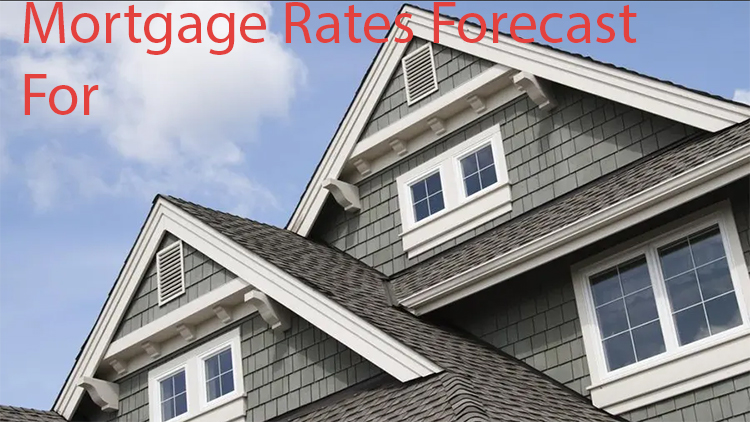Mortgage Rates Forecast mortgage interest rates have varied, remaining below 7% but increasing compared to the previous year. According to Freddie Mac’s report for the week ending February 22, the average 30-year fixed mortgage rate rose by 13 basis points to 6.9%. It’s important to note that a basis point equals one one-hundredth of a percentage point. This increase represents the third consecutive week of climbing mortgage rates. Economic indicators, inflation rates, and central bank policies are among the factors that impact mortgage interest rates.
Staying informed about these changes is crucial for potential homebuyers or those considering refinancing. Seeking advice from financial professionals can offer valuable insights for navigating the complex landscape of mortgage interest rates and securing favorable borrowing or refinancing terms.
Housing market experts have forecasted a decrease in rates for the year 2024, particularly when the Federal Reserve initiates a reduction in the federal funds rate, which subsequently impacts mortgage rates. Despite expectations of lower mortgage rates, there are apprehensions that this may not lead to a substantial improvement in home affordability. This concern stems from various factors including escalating home prices, stagnant wage growth, and limited availability of affordable housing inventory.
To cultivate sustainable homeownership opportunities for all, it is imperative for policymakers and industry stakeholders to address these challenges comprehensively. By devising strategies that tackle these issues head-on, we can work towards fostering an environment where owning a home remains achievable for a broader spectrum of individuals within society.
Outlines Of Guide
ToggleFed Holds Rates Steady for a Fourth Straight Time: What This Means for 2024 Mortgage Rates
The Federal Open Market Committee (FOMC) voted to keep the benchmark federal funds rate unchanged following its initial 2024 meeting, as widely expected. For the fourth time in a row, the FOMC maintained its policy rate, keeping the benchmark interest rate range at 5.25% to 5.5%.
The next meeting of the FOMC is scheduled for March 19-20. From March 2022, as the Federal Reserve started increasing interest rates aggressively to control inflation, mortgage rates have surged to their highest points in many years. However, rates have since decreased because of the Federal Reserve’s pauses in rate hikes and slowing economic data.
The most recent economic projections from the Fed indicate that there will be three rate cuts in 2024. However, Fed Chair Jerome Powell mentioned at a press conference after the meeting that officials will only start making cuts when they are sure that “inflation is steadily moving towards 2%.” The Fed also takes into account employment data and other economic indicators when making decisions.
Therefore, how will all of this impact mortgage rates in 2024?
Danielle Hale, chief economist at Realtor.com, stated in an email that for mortgage rates to decrease more significantly, both the market and the Fed will require further evidence of slowing inflation and a sustainable economy. She added that mortgage rates have been stagnant due to mixed recent data.
Mortgage Rate Predictions for 2024
- National Association of Realtors chief economist Lawrence Yun. The budget deficit is still high, and the different inflation measures are still above the acceptable level. This indicates that mortgage rates are expected to stay in the 6% to 7% range for the majority of the year.
- RSM U.S. real estate senior analyst Crystal Sunbury. In the absence of major economic shocks, it is anticipated that mortgage rates will gradually decrease in the coming months, potentially reaching a range of 6% to 6.5% by spring 2024.
- Mortgage Bankers Association (MBA). MBA’s baseline forecast is for mortgage rates to end 2024 at 6.1% and reach 5.5% at the end of 2025 as Treasury rates decline and the spread narrows.
- Bank of America head of retail lending Matt Vernon. “The Fed’s likely decision to cut rates in 2024 would be a key factor that could breathe new life into the housing market. However, it’s important to note that significant drops in mortgage rates might not happen in the early months of 2024. If any reductions occur, they are likely to be gradual, possibly beginning in the latter part of the year.”
- Palisades Group chief investment officer and co-founder Jack Macdowell. “Our best guess is that mortgage rates will remain in the 7% to 7.25% range throughout Q1 2024.”
- Fannie Mae Housing Forecast. The 30-year fixed rate mortgage will average 7% in Q1 2024 and slowly decline over the year, landing at a Q4 average of 6.5%.
- Bright MLS chief economist Dr. Lisa Sturtevant. [D]uring the early part of the year, expect some bumpiness in rates as new economic data are released and as more buyers get back into the market. However, the overall outlook for mortgage rates in 2024 suggests more rate drops, with Bright MLS forecasts predicting rates to hit 6.2% by the fourth quarter.
- KPMG Economics senior economist Yelena Maleyev. “Mortgage rates are expected to stay below 7% in the coming months as inflationary pressures ease and the path to [Federal Reserve] rate cuts in the second quarter remains clear. Upside surprises to inflation, employment and wages in the coming months would make the Federal Reserve consider waiting even longer to cut rates, which would then push up other interest rates, including mortgages.”
Is 2024 a Good Time To Refinance?
- More than 40% of mortgages in the U.S. were initiated in 2020 and 2021, a period of historically low interest rates. Additionally, around 14 million mortgage refinances took place during this period. If you were fortunate to obtain a mortgage at that time, it may not be advisable to refinance in 2024.
- Vernon suggests that if the rates are lower than when you initially obtained your mortgage, it could be a good time. However, the possibility of rates decreasing in 2024 will be influenced by economic conditions.
- Recent data from the MBA indicates that despite being slow, there have been some indications of increased activity in refinancing due to declining mortgage rates.
- According to experts, if the Fed reduces rates in 2024, there will be a further increase in refinance volume as borrowers with high mortgage rates will seize the opportunity to reduce their monthly expenses.
- Michele Raneri, vice president of U.S. research and consulting at TransUnion, mentioned in an email that a decrease in mortgage interest rates to 5.5% could lead to substantial savings for homeowners. Refinancing at this rate could reduce their average monthly payment to $1,917, saving them $284 per month.
- When thinking about refinancing to reduce your monthly payment, remember that not all choices result in lower interest payments throughout the loan term.
- Vernon advises to consider that while a lower rate may be available for refinancing, it may not be wise to do so immediately. Although your monthly mortgage payment may decrease, extending the loan’s lifespan and additional interest costs should also be taken into account.
Current Mortgage Rates 2024
| Loan term | Interest rate | APR | Monthly P&I Per $100,000 |
|---|---|---|---|
|
30-Year Fixed
|
7.22%
|
7.12%
|
$673
|
|
15-Year Fixed
|
6.33%
|
6.27%
|
$859
|
|
30-Year Jumbo
|
7.20%
|
7.18%
|
$677
|
Current Mortgage Refinance Rates 2024
The present average rates for refinancing mortgages are:
- 30-year fixed: 7.21%
- 15-year fixed: 6.75%
- 30-year jumbo: 7.32%
- 5/1 ARM: 5.96%
What Do Current Rates Mean for Refinancing in 2024?
Refinance volume remains low due to current housing market trends. The MBA’s Weekly Mortgage Applications Survey provides insights into recent refinance activity. Despite low mortgage rates, the refinance market has not been as active as in previous years. Homeowners may be hesitant, face stricter lending criteria, or lack awareness of potential savings. Before deciding to refinance, homeowners should evaluate their financial goals and circumstances. Refinancing can lower monthly payments, reduce overall interest, or provide cash-out for expenses or investments. By monitoring market trends and consulting professionals, homeowners can make informed decisions about refinancing.
| Refinance Activity | Weekly | Annually |
|---|---|---|
|
Week ending January 10*
|
+19%
|
+30%
|
|
Week ending January 17
|
+11%
|
+10%
|
|
Week ending January 24*
|
-7%
|
-8%
|
|
Week ending January 31
|
+2%
|
+3%
|
Despite the recent decrease in mortgage rates, the average 30-year fixed rate is still approximately half a percentage point higher than it was a year ago. Additionally, refinance rates typically remain higher than purchase rates.Amidst this scenario, numerous borrowers are holding onto the historically low mortgage rates they secured during the pandemic. It is improbable that these exceptionally low rates will make a comeback anytime soon, if ever, leading to limited incentive for many homeowners to consider refinancing their mortgages.
According to Joel Kan, MBA’s Vice President and Deputy Chief Economist, homeowners lack incentive to refinance despite low rates. However, the Federal Reserve’s decision to maintain rates and potential rate cuts in 2024 may increase refinance activity. This surge is expected from borrowers who purchased homes during high-interest rate periods and now want to take advantage of lower rates. Refinancing offers benefits like lower monthly mortgage payments, reduced overall interest paid, and access to home equity. Homeowners should evaluate their situation and seek financial guidance to determine if refinancing aligns with their long-term goals.
How To Get a Lower Mortgage Refinance Rate
Fortunately, even with higher rates, there are strategies available to help you obtain a lower rate. These strategies could be particularly advantageous if you purchased a home during specific time frames when rates exceeded 7%.
Refinancing is generally recommended by mortgage experts only if you are able to secure a rate that is at least 1% lower than your current rate, as there are closing costs and fees involved in the process.
Here are a few steps you can take to reduce your refinance rate:
- Get rate quote estimates from at least three lenders
- Ask lenders about waiving or reducing closing costs
- Negotiate with your lender to match the best deal
- Take steps to strengthen your credit score
- Save for a larger down payment
- Choose a shorter-term loan
- Buy discount points
Mortgage Rate Predictions for the Next 5 Years
Forecasting mortgage rates for the next five years is a challenging task, given the significant fluctuations in the past year, but experts believe that the low housing inventory will play a crucial role in determining long-term rates.
- Daryl Fairweather, the chief economist at Redfin, predicts that if rates decrease, we will experience a competitive housing market with high demand and low inventory, leading to increased prices and ongoing affordability challenges.
- Fairweather anticipates decreases in interest rates in the coming years, although the timing of this downward movement is uncertain.
- She says that rates will decrease in every situation, it’s just a matter of when.
- The “when” for Melissa Cohn, who is the regional vice president at William Raveis Mortgage, won’t be in 2023, but she doesn’t consider it too far away.
- Cohn predicts that mortgage rates will decrease over the next two to three years as inflation rates decrease and approach the Fed’s target of 2%. He believes that mortgage rates will be at least 2% lower by 2025.
- She further states that as long as the inflation rate stays at 2%, we can expect mortgage rates to stay at lower levels for the next five years.
What Affects Mortgage Rates?
Mortgage interest rates are influenced by various factors, including the economy, Federal Reserve policies, and inflation. However, the bond market has a direct impact on long-term mortgage rates. Additionally, individual elements such as lender costs and borrower financial situations affect the specific interest rate offered. To make informed decisions about securing a mortgage at a favorable rate, it’s important to understand these factors and stay informed about economic trends and personal financial health.
Interest rates are influenced by the level of demand for mortgages. High demand can lead to increased rates, while low demand may result in competitive rates and incentives. External factors such as economic conditions, government policies, and market trends also play a role in impacting mortgage rates. It is important for borrowers and lenders to stay informed about these factors to make informed decisions.
How To Shop For the Best Mortgage Rate
Getting an optimal rate on a home loan can save you a significant amount of money over time. Here are some tips that can help you get the best rate possible for your situation:
- Keep your eye on rates. Mortgage rates are continuously fluctuating, so staying vigilant will help in securing a more favorable rate.
- Check your credit.When you request a mortgage, the lender will assess your credit to evaluate your creditworthiness and the interest rate you qualify for. Typically, the higher your credit score, the more favorable your rate. Before applying, it’s wise to check your credit and challenge any inaccuracies with the relevant credit bureau to potentially improve your score.
- Shop around and compare lenders. Examine various mortgage lenders’ options extensively to discover the most favorable deal. Potential buyers have managed to save over $1,500 throughout the loan’s duration by obtaining two quotes from lenders and saved approximately $3,000 when obtaining five quotes, as reported by Freddie Mac.
What are mortgage rates?
Mortgage rates refer to the expenses involved in obtaining a loan for buying a home. Due to the high cost of properties, many individuals cannot afford to pay for them upfront and therefore choose to spread out the payments over extended periods, typically up to 30 years, in order to manage the monthly payments more feasibly. Mortgage rates also increase or decrease in response to changes in the economy and financial markets, which are reflected in the rise and fall of interest rates.
What is a mortgage rate lock?
A mortgage rate lock ensures that the rate offered in your mortgage application acceptance will be the rate you ultimately pay, provided you close within a standard timeframe and do not make any changes to your application. During a time of increasing or unstable interest rates—such as the current one—it might be prudent to secure a rate that appears reasonable for you.
When should I lock my mortgage rate?
Timing any market can be challenging, and this applies to mortgage rates as well. When the conditions are uncertain and interest rates are expected to increase, it might be wise to secure a rate that is suitable for your budget and appears reasonable to you. Make sure to inquire with your lender regarding the potential outcomes if you do not close within the specified timeframe stated in the rate lock agreement, as well as the potential implications if the rates decrease after you have locked in a rate.
How do you calculate your mortgage payment?
- Principal. The amount of funds you borrow from a lender for your mortgage.
- Interest. The cost the lender charges you for borrowing the funds.
- Property taxes. Payments are based on local property tax rates.
- Homeowners insurance. A separate policy for insurance coverage based on the value of your home and property.
- Private mortgage insurance (PMI). Typically only applies if you take out a conventional mortgage with a down payment below 20% of the purchase price.
- Homeowners association (HOA) or condominium fees. Only applies if your property is part of an HOA or you own a condominium.
- Escrow. An account reserved for property taxes, homeowners insurance and mortgage insurance, managed by the lender.
- Additional costs. Examples of potential additional costs include home warranties and flood insurance.
Will mortgage rates go down in 2024?
Predicting the future direction of mortgage rates is challenging due to various factors at play, but experts anticipate a gradual decrease in the coming years, albeit not in the near term. Eric Fox, chief economist and senior vice president of analytics for Veros Real Estate Solutions, states that according to our economic models, mortgage interest rates are not expected to decrease in the near future. He also predicts that interest rates will need to stay high for a while in order to have the intended effect of slowing down the economy, with the impact becoming apparent in the long term, potentially by 2024. Fox’s models indicate that the rates are expected to remain at 7.5% or higher for the entirety of 2024.
What is the mortgage rate forecast for the next five years?
The Federal Reserve’s economic forecasts suggest that the federal funds rate will stay elevated until 2025 and beyond initial expectations. However, the forecasts also suggest that reductions are anticipated. Should these forecasts hold true and the Fed initiates a reduction in its primary rate, it is likely that mortgage rates will also decrease.
- Sunbury anticipates that the Federal Reserve will reduce rates by 100 to 125 basis points, commencing in May or June of 2024.
- Sunbury explains that this would result in the policy rate being between 4% and 4.25%.
- Sunbury predicts a decrease in mortgage rates, but she does not expect the rock-bottom rates from 2021 and 2022 to return soon.
- She says that with the easing of inflation and the decrease in the policy rate, we can expect 30-year fixed mortgage rates to decrease to the range of 5.5% to 6% and stay in this range for a longer period.











































